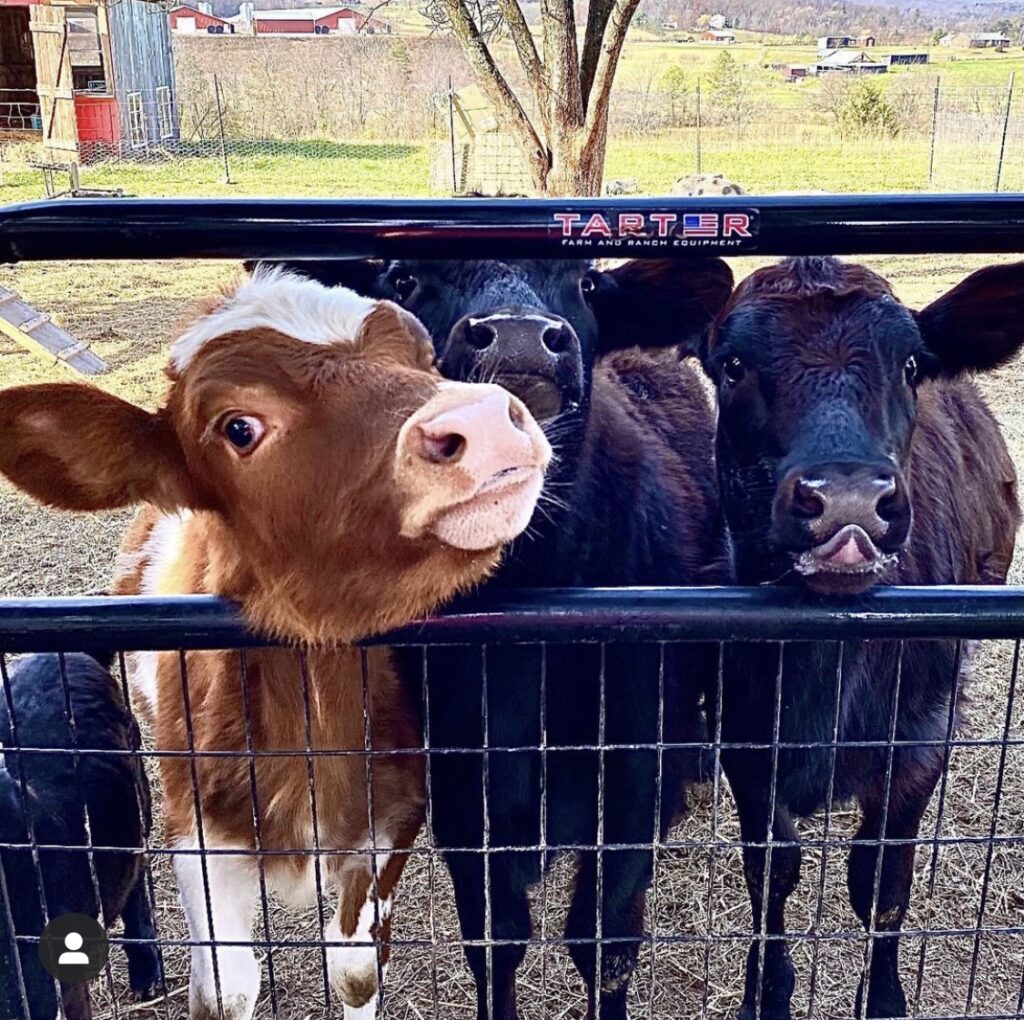Inspiration: Interview with Jason Bolalek, Founder of Destination Liberation
“Darkness cannot drive out darkness, only light can do that.”
Martin Luther King Jr
The world needs more heroes, especially during these dark days. Every once in a while we come across someone who leaves a huge impression on us by the selfless work they are doing.
Please meet real life hero, Jason Bolalek, founder of Destination Liberation, a Vermont-based animal rescue organization. Jason is a man on a mission, dedicated to rescuing male calves from dairy farms (who are seen as mere waste products in the dairy industry) and finding them forever homes .

You may have seen Jason on social media or the popular Dodo videos showing him transporting adorable baby cows in his car to animal sanctuaries that will give these babies a forever home.
Jason has so far saved around 50 calves bound for slaughter in just over a year and half. But Jason is just getting started. He has many future plans and is eager to impart his message on the world to help others make the connection that we can live healthy and happy lives without using and slaughtering innocent animals.
It was a pleasure speaking with Jason about his goals and hopes for the future. Please read on for my interview with Jason –
What was the catalyst for your deciding to go Vegan and found your organization, Destination Liberation?
I moved to Vermont from Western New York about four years ago to work in the hemp industry. I was already a vegetarian at this time (after seeing just one video online) but didn’t really know what went on at dairy farms. After about two years of living in Vermont, I had heard about local dairy farms and what they do to the male calves after they’re born. Farmers separate the babies from their mothers when they’re born, and will oftentimes hit the male calves over the head or shoot them if they don’t weigh enough to send to slaughter. Because male calves don’t produce milk, they are considered waste products by the dairy industry.
When I visited a dairy farm and learned first hand what was happening to the animals, I went vegan overnight. I could no longer drink milk or eat dairy knowing what I knew. It made me crazy that I didn’t realize sooner what was happening, that I didn’t learn the truth until my forties. It’s part of our culture not to question. I think there’s something so wrong with our inherent lack of knowledge about what happens to the innocent animals. This is what really drives me, that the mass public is so unaware of the truth.
After learning the truth about dairy, I knew I had to try and rescue a few of these calves. And so I did, and continue to do so….and Destination Liberation was born.
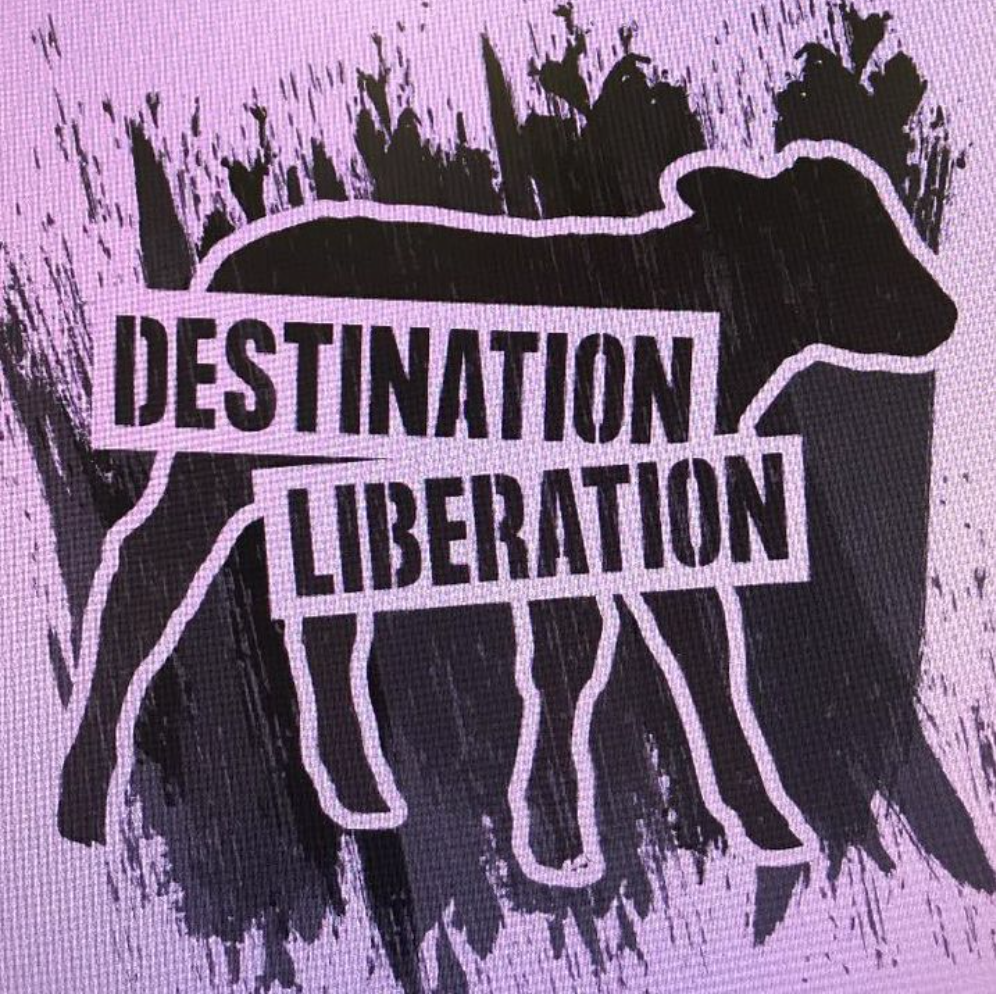
Rescuing these animals and spreading the message that these animal’s lives matter is what I’m called to do. Since I’ve started doing my rescue work, every door seems to be opening and people have been so helpful. It’s incredible.
You have mentioned that you have developed relationships with some of the local dairy farmers and that they look to you as a solution. Can you tell me more?
Since I began saving the male calves, farmers as well as sanctuaries have reached out to me. Ultimately, it’s like its own ecosystem where I am connected to farmers who don’t want to kill their calves along with sanctuaries and private adopters who want to help.
Many of the farmers I’ve come across really don’t want to kill the baby boy calves. So, I’ve become part of the solution for these farmers. Because there’s no money in raising these male calves, the workers and farmers welcome me taking these babies off their hands (so they can avoid the terrible alternative of shooting these babies).
When I rescued Eli, I got to know three generations of farmers – the grandfather, his daughter and the granddaughter. I can see clearly that compassion increases as the generations go down the line. The granddaughter follows me online. Even though she was brought up in this farming life, she is open to seeing another way. I believe if the granddaughter were to inherit the farm, a change could happen. The whole family has watched Eli’s (and Ferdinand’s) journey online.
There’s also a lot of pain in making change for the producers of food. Take the dairy industry. Dairy is clearly suffering with all the new, alternative plant based products on the market. You hear of large and small farmers filing for bankruptcy. So the question becomes, how can people help the farmers (many who are multi-generational) make the switch to a more compassionate means of making a living? It would be great to see more farms transition to growing plants, but it’s very difficult economically for farmers to do this. They need a big contract, like Oatly to make economic sense. So, how do we help these farmers? We need solutions.
“I think we need to cultivate compassion and empathy for humans as well as animals. We’re all learning and growing, vegans included.”
~ Jason Bolalek
Vegans have been known to be angry and judgmental of non-vegans. How do we move the dial towards veganism without being judgmental?
I understand the frustration. There are very few people in the world that will say they’d eat a dog, yet they will eat a cow or a pig. As vegans, we have to remember that good people can take part in bad activities. I’ve met many farmers and they are good people….they are not bad people. It can be a tough thing to reconcile what they do to the animals, but we’ve all been taught that it’s normal to eat animals. It’s hard to break out of this cycle.
I think we need to cultivate compassion and empathy for humans as well as animals. We’re all learning and growing, vegans included. It’s easy for vegans to be angry when we can see so clearly what’s being done to the animals. But just because we’ve made the connection doesn’t mean everyone else has. We all have the capacity to grow….we each grow at different rates. And we continue to grow throughout our lives. We don’t have a finish line that we reach so to speak.
I also think it’s very scary for people to change, especially farmers. Very few people can break away from the generational cycle and tradition of farming. They would have to admit they’re wrong or that their families are wrong, and that’s difficult to do. But we can continue planting seeds to move the dial towards veganism. While the idea of veganism is difficult for many, I believe veganism is right on every level and it’s the only way forward.
Ultimately, we need to have more plant based options in smaller towns as well as the smaller cities to help people make different food choices. Where I live for instance, in rural Vermont, there are no vegan options. I recognize and understand even though market options are not a solution to the problem, they do show the public there is another way.
I’ve always maintained that we can learn so much from the animals and each has his or her own personality. As you have come to know the calves that you rescue, what have you learned?
Yes, we can most definitely learn a lot from animals. The biggest takeaway from being with the calves is that they are so peaceful and have a very calm presence about them. It’s really beautiful. But sadly, the animals are at our mercy, they are completely dependent on us, and that’s heartbreaking. They’ve been handled so much from birth that they’re initially very apprehensive and unsure of what my intentions are. They just want people not to hurt them, and sadly, people do. Humans hurt animals in so many different ways. This is what drives me to help them.

Their personalities really come out when we arrive at the sanctuaries, and the calves do their little happy dance. They run around and play and do their ‘zoomies’ – just like puppies. What is clear is that there is absolutely no difference between these calves and puppies that we see as pets.
You are clearly on a mission to change the world and save animals. When you look back to your childhood, did you always have compassion towards animals?
In my 30’s, I was fairly self indulgent, making and spending money, but it felt so hollow to me. When I look back, I can see that my connection with animals was always in me. Like the bond that I felt for my dogs and how tuned in they were to me. There are moments or benchmarks from my past that I can point to.
For instance, my dad used to hunt and shoot pheasant. He taught me to shoot, but I was never into hunting or fishing. I remember there was a bird that couldn’t fly in our yard, and my dad said to me that I should make a nest for the bird. I was so worried about that bird….I felt a deep responsibility for him. But what I found most interesting was that my father showed compassion to this bird and yet he hunted birds. I realized at a young age there was a total disconnect in him. I think once you develop a bond with an animal, it’s easier to make the connection that all animals have sentience.
Your work has to be very rewarding but also at times frustrating as you can’t save all the animals. How do you stay mentally and emotionally strong?
Yes, there are tough moments, and I sometimes get emotional because of the heaviness that I see and carry around. But mostly, I feel inspired, especially when I’m around the animals. The calves have such a calm presence about them that rubs off on me. It’s so rewarding helping them, and it feeds my spirit and soul. I sometimes have anxiety because I worry about their health when they’re in my care. But this work is so powerful, and the rewards far outweigh any negatives. I just want to keep doing what I do.
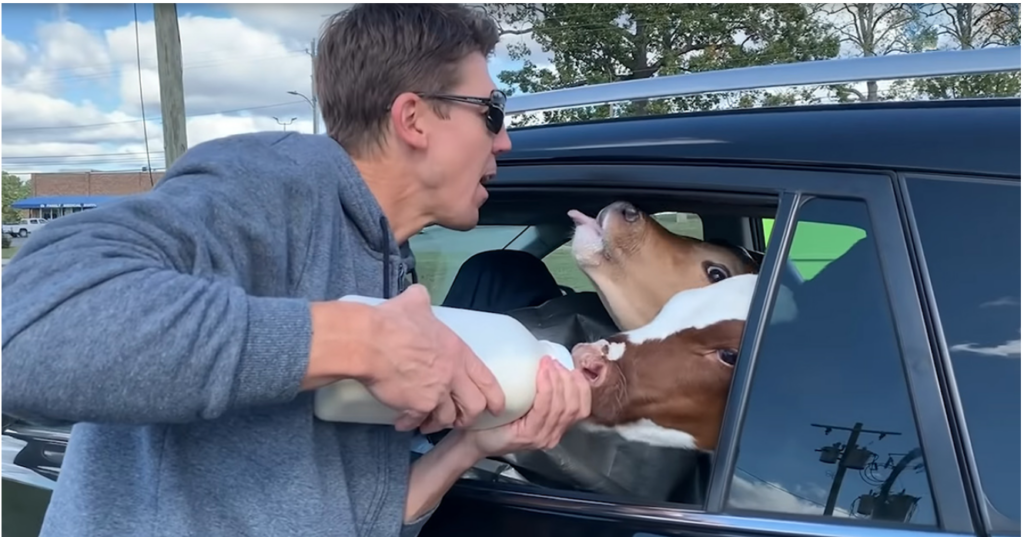
I actually have a visceral reaction when I’m getting ready to do a rescue and there’s hay in my car. I get an adrenaline rush when I know I’m about to achieve an important goal. I think it’s called a ‘helper’s high’.
What I have had to come to terms with is that I can’t save every calf. There isn’t always a happy ending for every one of them, and that’s tough. But even with the pain and sadness of not being able to help all the calves, that’s not going to stop me from being on the right side. There is so much that needs to be exposed, and there’s so much reward in this work. I feel this is what I’m here to do, it’s my purpose.
Plus, the community supports me so much – the online community, the sanctuaries, the people who want to spread my message, the donations. It’s incredible!
Besides the important work of rescuing animals, what is the biggest message or messages that you are trying to convey?
- Being vegetarian isn’t enough. The dairy industry is just as cruel as the meat industry. So all messaging has to be vegan messaging.
- We must open up and talk about what we believe in passionately. People respect honesty and authenticity and when you take a stand for something.
- As a species, humans can be so arrogant. We may have innovated brilliant ideas and created all this stuff, but how smart are we when we’re bombing each other and destroying our own nest?
- We have to stop fueling a system that is killing us – on every level. The environment is being destroyed, meat and dairy is getting us sick, workers are being exploited, pharmaceuticals are making billions off of us, not to mention billions of animals being slaughtered every year.
- The more exposure those of us fighting for animal rights get and the wider the audience, the more of a dent we can make in the dairy and meat industries. I believe the dairy industry will be the first to collapse. If it was’t for the subsidies, these animal agriculture industries wouldn’t make it….it’s the government subsidies that keep these industries alive.
- Ultimately the larger message is about waking people up. It helps that the calves I rescue are so cute. They help people make a connection. The calves are really the ideal hook to get people interested in the animal’s lives and what’s happening to them behind the scenes.
I want to add there’s an important message in the film, Earthlings –
“We (humans) measure intelligence through our own lens.” This is sadly arrogant – we only see through our eyes. Yet there is something much greater than us. We lose this important message.
How do we get people to see animals as sentient beings, as lives deserving of freedom and love?
People need to be exposed to what happens at a dairy farm and in slaughterhouses. If people are not taught the truth or never go to a sanctuary to see farm animals, then they don’t know anything about these animals or the horror they go through.
We’re trained to be consumers, so that the system functions. The system is not designed to allow us to think or to question what we’re told. People will tune you out if you bombard them with facts. So, seeing a video of cow puppies being saved resonates with others and helps them make the connection that these are just babies who are being exploited and murdered.
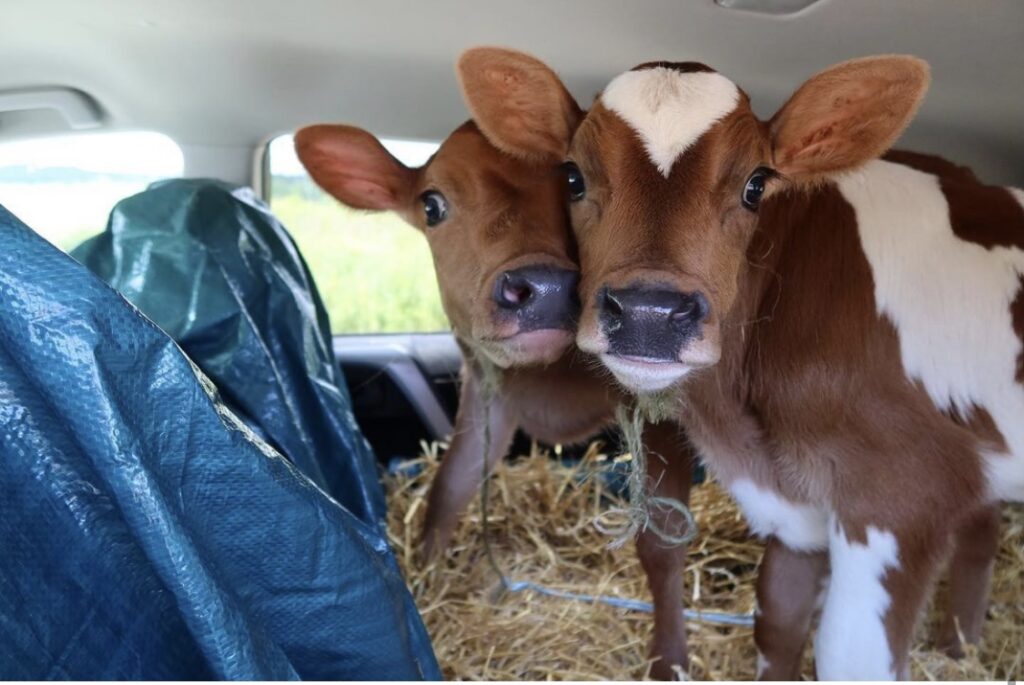
Ultimately, we really need to get to the children at an early age. If they truly understood what was happening to animals, they would surely be vegan. The indoctrination that we all get from society from a very young age turns innocent children into adults who don’t question the status quo. So the question is how can we appeal to the children before they’re too indoctrinated from birth to believe that some animals are for eating?
My friend is a teacher in New Jersey – she told me a story about teaching kindergartners where meat comes from. And how the kids’s parents became angry with her because the kids refused to eat meat after learning where it came from. The real question is – why can’t we tell kids the truth?
This is a question I have for all vegans as people genuinely don’t know what vegans eat on a daily basis. Since going vegan, what does a typical day look like for you…. breakfast, lunch, dinner, dessert?
- For breakfast, I like a bagel or sprouted grain flat bread with avocado and the everything seasoning from Trader Joes. Or I’ll have granola with blueberries.
- For lunch, I like veggie wraps… or I’ll have soup or salad. I like Amy’s soups. Or I sometimes grab pizza without the cheese at my local pizzeria.
- For dinner, I’ll do a grain bowl with veggies, quinoa or brown rice and some kind of sauce that I make. I like the Minimalist Baker for their vegan recipes.
- For dessert, I’ll have dark chocolate. I don’t do too much sugar.
Before going vegan, I was addicted to butter. Now, I’ll eat plant based butter or Chao cheese by Field Roast. It’s amazing what’s being created with plant based foods these days.
Overall, I try not to eat too much vegan junk food.
You are certainly an inspiration to many others. I’m curious who or what inspires you?
- The documentary, Earthlings was a huge inspiration for me. The writing by Shaun Monson is incredible, and the tagline ‘Make The Connection’ is just so powerful.
- Dr Melanie Joy, author of “Why We Love Dogs, Eat Pigs, and Wear Cows”. I think she’s brilliant.
- Connie Spence, aka ‘@vegan_batgirl – she focuses on different parts of the animal rights movement – activism needs to be focused on our political system.
- Bite Size Vegan @bitesizevegan – she’s great – I’ve learned a lot from her, from an academic viewpoint.
- Earthling Ed @earthlinged – He has a real talent for disarming people who may have their defenses up. We can learn from the conversations he has with others and how he deals with different arguments. He is constructive and informative without being threatening.
- Joaquin Phoenix – His speech at the Oscars was the greatest speech I’ve ever heard. His speech was a perfectly crafted message – it touched on equal rights, the environment, dairy cows, among other things. Joaquin’s speech shook me to my core. I love that he reached and influenced so many people through his immense platform.
And all of the animal sanctuaries inspire me – below are just a few that continue to inspire me –
- Critter Creek Sanctuary in Gainesville, FL. Erin Amerman is a cow expert and just an amazing person. Her sanctuary is enormous, divided into two different parts with 200 acres each. She has nearly 100 cows, more than any sanctuary in the US. She also has water buffalo and pigs and many other animals. There are woods, rolling hills, a pond and so much room for the animals. It’s how all animals should live.
- Iowa Farm Sanctuary – Jered and Shawn Camp founded the first vegan sanctuary in Iowa where they are surrounded by herds of 4,000+ cows being raised for the dairy industry. I’m so impressed with what they’re doing in the middle of all of this while trying to educate people. It’s so inspiring.
- Sisu Refuge – Erika Lovato began rescuing pigs in Central North Carolina which has the largest concentration of pig farms. Erica is a warrior for the animals.
- Santuario Vale da Rainha in Brazil is run by yoga instructor Patricia Favaro (with her husband Victor) who uses music and calming techniques to soothe cows and buffalo. When she uses her Tibetan singing bowl, the animals will sing. It’s so beautiful.
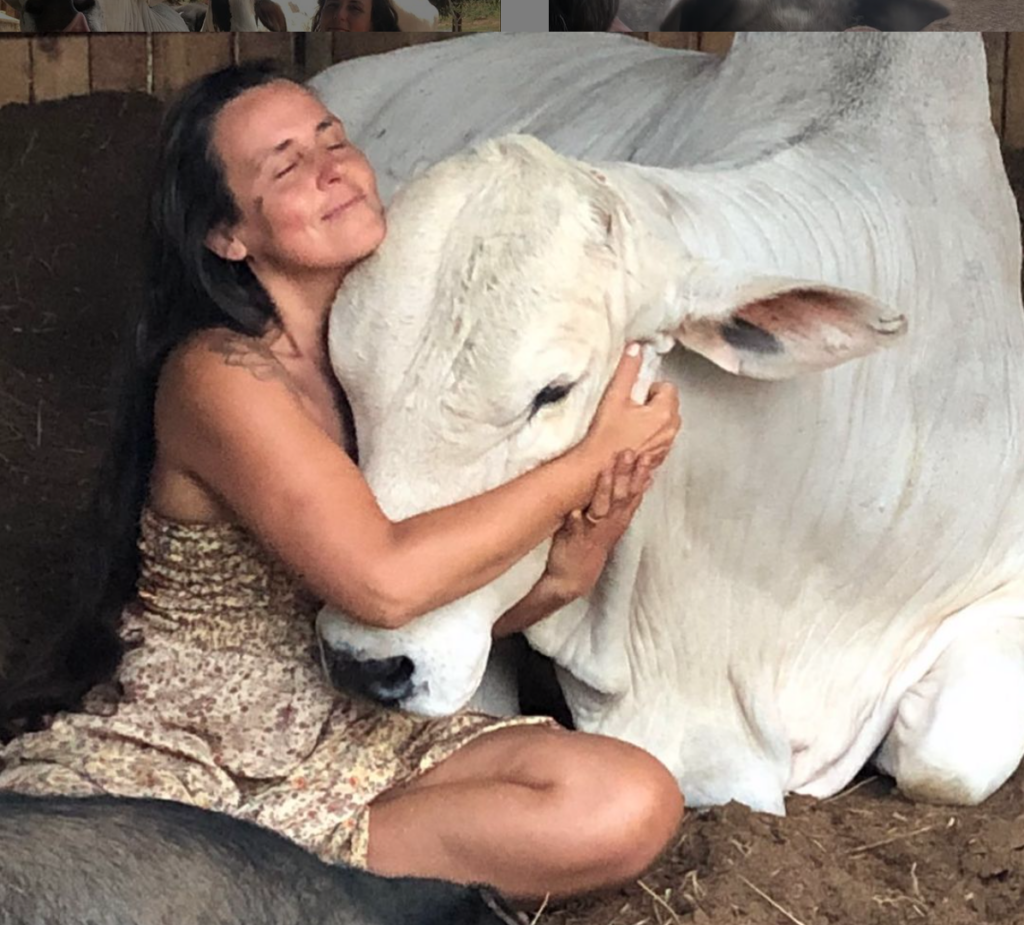
If you had a magic wand, what would be the biggest goal you’d like to initiate / accomplish?
Short term, I’d like to launch a docu-series and tell stories of people making a difference with the goal of reaching millions of people. There are so many stories to tell….the farmers who have been indoctrinated from generations upon generations, the stories of the animal sanctuaries providing homes to animals saved from slaughter, and my own stories of rescuing calves. The more stories we tell and the more people we reach, we can create a ripple effect of change.
Long term, I would like to start a production company, to help launch other people’s stories. I would like to get into producing projects and start a media company with the entire message being about animal rights. I’m currently making a deck and getting some help on how to pitch my ideas. I know there’s a demand for my videos….there’s something there that people want to see. I just need a partner to take on this project with me.
And of course I want to continue Destination Liberation and coach other people to help with the rescues so I’m free to grow this organization.
How can people best support you in your mission to save as many animals as possible and to spread the word?
Follow me on social media – like, comment and repost. Social media is an incredible tool to convey information – especially Instagram, Facebook and TikTok. Show others my videos and tell them about what I’m doing for the calves. Social media has been a great way to update people on the babies that we’ve rescued, who are now happily living in their forever homes.
Donations are always appreciated. People can donate to Destination Liberation via PayPal – destinationliberation@mail.com (not Gmail) or Venmo -Destination Liberation (2 words).
Also, there’s a need for more animal sanctuaries. One of the biggest issues is finding homes for these rescued calves. My concern is that there will not be enough sanctuaries to take these rescues to. There are private adopters but not everyone knows how to handle a calf / cow. These animals have very specific needs. Also, the animal sanctuaries that do exist need our help. It’s very hard for smaller sanctuaries to get noticed and to get donations. If you have a favorite animal sanctuary, please donate….no donation is too small.
“Veganism isn’t the solution to all of our problems, but there is no solution without it”
Melanie Joy
You can follow Jason at the following links –
https://www.instagram.com/jasonbolalek/
https://www.facebook.com/jason.bolalek
And to donate to Destination Liberation –
Venmo: Destination Liberation
PayPal: destinationliberation@mail.com
